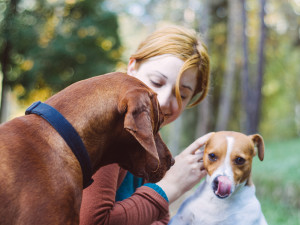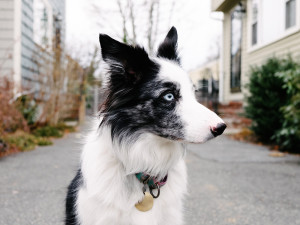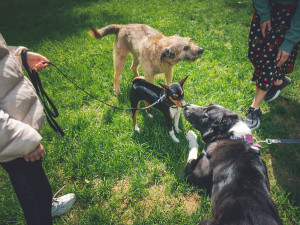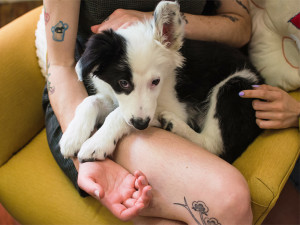Your Grumpy Dog Is Very Smart—Science Says So
This study found that cranky pups are actually very fast social learners.

share article

Your pet wants you to read our newsletter. (Then give them a treat.)
If we learn anything as we age out of the desire to leave the house after 10 p.m. or have a friend force last-minute plans upon us, it’s that being a grouch isn’t necessarily a bad thing. In short, embrace the crankiness — wisdom some of our pets have long been enjoying. In fact, in 2021, one study found that the grumpiest pups among us may also be the smartest.
The Hungarian studyopens in a new tab examined how quickly dogs can learn based on their temperament. “People usually look at the different behaviors of dogs as completely separate phenomena and handle them as such. While I think it is important to be able to identify behaviors separately, it is as important to see their connections,” says biologist and one of the study’s authors Kata Vékony.
Before starting the experiment, researchers issued a questionnaire to participating pet parents to gauge their dog’s behavior. Questions were not super obvious like, “Is your dog grumpy?” or “Is your dog cheerful?”. Instead, they enlisted a series of inquiries to effectively determine each dog’s vibe. This featured questions on how pups behaved when groomed or bathed, whether they barkedopens in a new tab at things or situations they don’t like, or if they’ve ever snapped at or bitopens in a new tab other dogs or people. The team then used this information to assign each animal an “irritability” score.
How the Grumpy-Dog Study Worked
AtEötvös Loránd Universityopens in a new tab in Budapest, Vékony and her colleagues essentially tried their best to tick off every dog by presenting a favorite treatopens in a new tab or toy in plain sight behind a V-shaped wire mesh fence. Naturally, an animal’s instinct is to head straight for the thing they want, so the test was to see how quickly they’d learn to go around the fence. The dogs were divided into three groups, starting with one that had figure their way around the V alone. After the designated 60-second timer was up, most didn’t make it to the prize. Next, the researchers watched a group of dogs attempt the pseudo maze with assistance from their parents. To Vékony’s shock, dogs categorized as agreeable and those holding the “grumpy” label performed equally well in these groups.
“We initially thought that dogs with more ‘smooth’ relationships with their owner would learn better from them so it was a surprise that we found no difference between dogs in learning from the owner,” Vékony explains. But the true revelation came with the third group, which went through the experiment with guidance from a stranger. What the researchers found was that the grumpy canines were significantly more successful in completing the task, in comparison to those defined as cheerful.
“Interestingly, it turned out that dogs that are less tolerant to being bathed or groomed or not getting things their way, in general, are also the ones who are more persistent and goal-oriented,” Vékony says, before noting that this does not mean crabbier dogs are necessarily more intelligent.
A Grumpy Dog Is a Socially Intelligent Dog
Given the parameters of the study, these findings only indicate that grouchy pups are more susceptible to social learning. As she explains, “It’s not intelligence overall or problem-solving ability but specifically social learning. These dogs are sensitive and not very tolerant of unpleasant or uncomfortable social situations so it is understandable that they pay more keen attention to the actions of humans around them. And attention is a key ingredient of social learning.”
Of course, there are a few caveats to the results. Notably, the researchers didn’t consider breed in the study. Additionally, behavioral issues, such as human or animal aggression or separation anxiety, were not factored in. Vékony confirms that to include these components, they would have needed a much larger sample size.
That being said, there is plenty to take away from the study — namely that grumpy dogs are not less good or productive. Clearly, the research shows that cranky pups can be perfectly well-behaved. And as long as you’re not trying to make them wear colorful sweaters or hang with too many upbeat characters, they’ll listen and pick up training cues quickly. Ultimately, these dogs are just comfortable with their wants and dislikes. They’re happy to pursue the things they like and avoid what they don’t. It’s something we could probably continue to learn from them.
“After the events of the past few years, I’m surprised most people still have some of their social skills left,” Vékony says. “But as a grumpy human of a grumpy dog, I can say that sometimes we should just embrace our grumpiness.”

Sean Zucker
Sean Zucker is a writer whose work has been featured in Points In Case, The Daily Drunk, Posty, and WellWell. He has an adopted Pit Bull named Banshee whose work has been featured on the kitchen floor and whose behavioral issues rival his own.
Related articles
![Close-up portrait of a wide-eyed Border Collie dog standing in the driveway of her home]() opens in a new tab
opens in a new tabWhy Is Your Puppy Such a Shy Guy?
It actually has a lot to do with genetics.
![Three dogs on leashes meeting and sniffing each other on a walk on the summer grass with owners]()
How Do I Get My Shy Dog To Socialize?
The Wildest Collective dog trainer Robert Haussmann’s tips for getting a shy pup to go from wallflower to social butterfly.
- opens in a new tab
Is Your Dog a People Pleaser?
Yes — and no. Here’s why positive-reinforcement training matters.
![A Golden Doodle puppy chewing on a bully stick while laying on a bright colored pillow on a black couch]() opens in a new tab
opens in a new tabWhat to Do (and Not Do) When Your Puppy Is Teething
When those little razors start biting, keep these tips in mind.
![A woman sitting on a couch with a dog.]() opens in a new tab
opens in a new tabDoes Your Pet Need Therapy?
Dogs and cats can’t read self-help books, so a veterinary behaviorist explains how your pet may benefit from being in treatment.
- opens in a new tab
Do Anxious Dog Parents Raise More Anxious Dogs?
Which comes first: a nervous person or a nervous pup?









